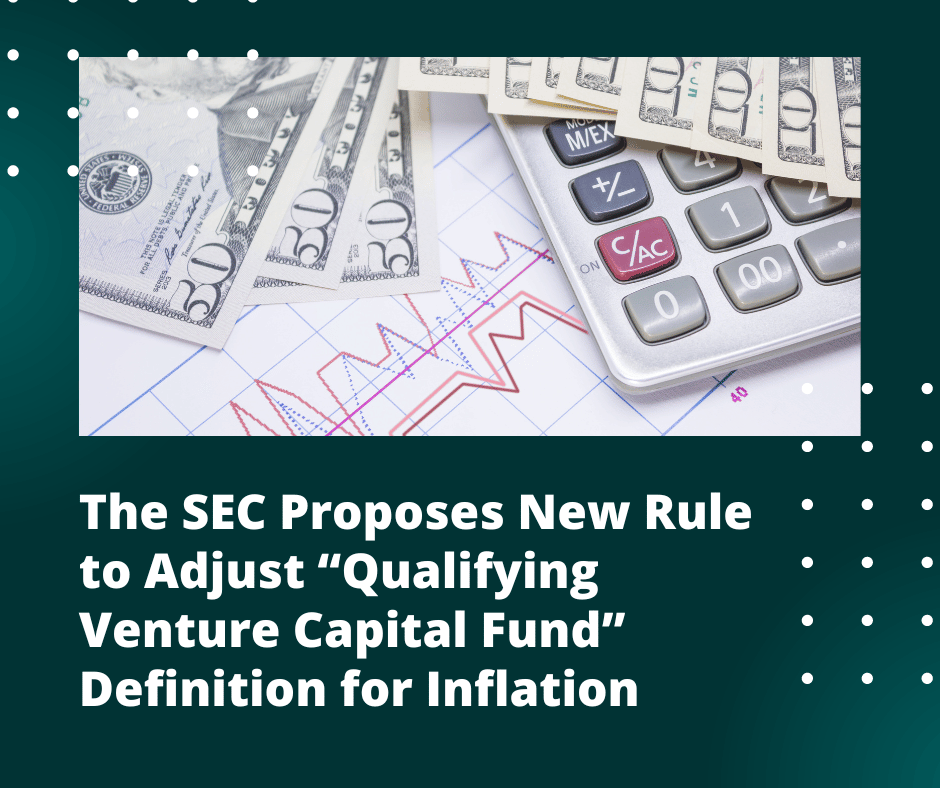The SEC Proposes New Rule to Adjust “Qualifying Venture Capital Fund” Definition for Inflation
VerifyInvestor.com
On February 14, 2024, the Securities and Exchange Commission (SEC) announced that it would be updating the dollar threshold needed for a fund to qualify as a “qualifying venture capital fund” for purposes of the Investment Company Act of 1940 (the “Act” or “Investment Company Act”) registration exemption.
The proposed rule would increase the dollar threshold from the current $10 million USD aggregate capital contributions and uncalled committed capital, to $12 million USD aggregate capital contributions and uncalled committed capital.
So, what is this new rule all about?
Let’s see.
Adjusting the Definition of “Qualifying Venture Capital Fund” for Inflation: What’s it all about?
Let’s begin with a basic understanding of what venture capital funds (or VCFs) are.
Venture capital funds are key to the business economy and technical innovation. This is because VCFs provide funding and support to start-ups and small companies in new and emerging areas of technology and business.
A venture capital fund is a private equity investment tool. It operates by pooling investments from accredited investors and then using that money to purchase, run, and sell, promising start-ups or companies in new or emerging fields. Quite often these companies are high-risk yet have considerable growth potential — making them very attractive investments.
Unlike other funds (for example, hedge funds), VCFs actively manage and run the companies they invest in. In addition to being high-risk investments, VCFs require considerable capital investment — making them available generally only to venture capitalists and accredited investors.
Issuers and fund managers can use an accredited investor verification service to verify accredited investors.
If an issuer holds itself out as being “engaged primarily in the business of investing, reinvesting or trading securities” it must register as an “Investment Company” under the Investment Company Act of 1940 (the “Act” or “ICA”). Registering as an “investment company” is expensive. It also carries with it considerable burdens as a result of the reporting and disclosure requirements. In addition, registering as an “investment company” exposes an entity to more regulatory oversight. Not surprisingly, most VCFs would rather avoid registering as an investment company if at all possible.
However, avoiding registration as an investment company is an option only if a VCF qualifies for an exemption under the law.
Exceptions to the Investment Company Registration Requirements: Sections 3(c)(1) and 3(c)(7) of the Act.
Recognizing the difficulties that registering imposed — especially for smaller venture capital funds — Congress created the “qualifying venture capital fund” exemption under the Act.
The Act provides two (2) exclusions that VCFs or private equity funds can choose to use in order to avoid registering as an “investment company.” They are: section 3(c)(1) and section 3(c)(7) of the Act.
Section 3(c)(1) of the Act exempts a venture capital fund from registration if the fund:
Does not make, or does not propose to make, a public offering of its securities, and
It is limited to no more than 100 accredited investors.
Section 3(c)(7) exempts venture capital funds that:
Do not make, or propose to make, a public offering of its securities, and
Are exclusively owned at the time of acquisition by individuals who are qualified purchasers.
If a private fund meets the requirements of section 3(c)(1) and it manages $10 million USD or less, it will be a “qualifying venture capital fund,” and allowed to have up to 250 accredited investors.
Section 3(c)(1) was amended by section 504 of the Economic Growth, Regulatory Relief, and Consumer Protection Act of 2018 (EGRRCPA”) to exclude “qualifying venture capital funds” from the definition of an “investment company.” In addition, the EGRRCPA added a new section to the Investment Company Act that defined “qualifying venture capital fund” as “a venture capital fund that has not more than $10,000,000 in aggregate capital contributions and uncalled committed capital.”
Finally, the EGRRCPA requires the SEC to index the dollar figure for the venture capital fund threshold to inflation once every five (5) years.
The SEC Proposes New Rule to Adjust Qualifying Venture Capital Fund Definition for Inflation.
In accordance with its recent announcement, the SEC is proposing a new rule (rule 3c-7) that will amend the Act to adjust the “qualifying venture capital fund” definition for inflation. The new rule will also clarify that the SEC will issue subsequent inflation adjustment orders every five (5) years. It will also detail how those adjustments will be determined.
The SEC will use the Personal Consumption Expenditures Chain-Type Price Index (“PCE Index”), published by the Department of Commerce, to calculate the inflation adjustments for purposes of the new Rule 3c-7. The proposed rule will increase the dollar threshold of aggregate capital contributions and uncalled committed capital that a qualified venture capital fund may raise from the current $10 million USD to $12 million USD.
The SEC’s proposal will remain open for public comment until March 22, 2024,
At VerifyInvestor.com we understand the regulatory challenges facing issuers and investors alike. That’s why we offer world-class accredited investor verification services. Our services are fast, efficient, cost-effective, confidential, and reliable. We help companies fully and easily comply with their legal obligations to verify investors as accredited investors.

